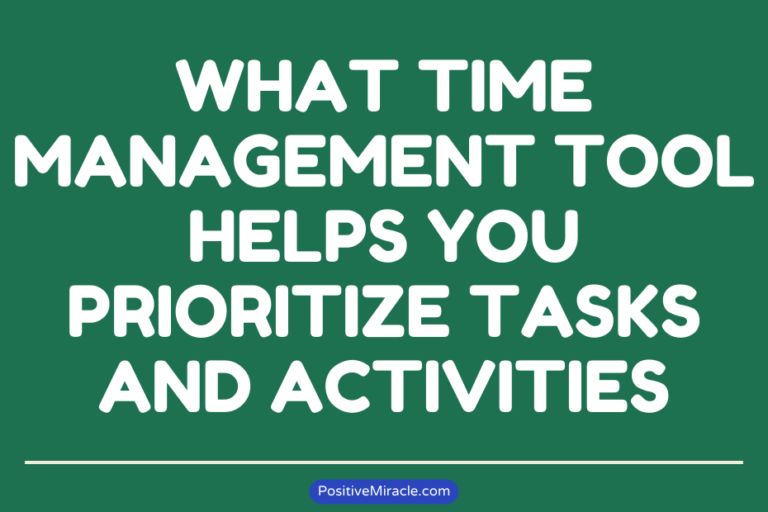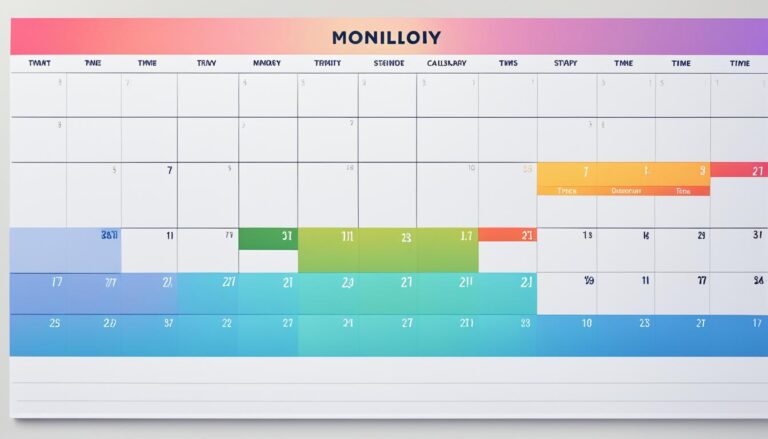Master Your Day: Time Management for Leaders

Do you ever find yourself overwhelmed by the countless responsibilities of leadership? Are you struggling to make strategic decisions and lead with clarity and productivity?
Effective time management is a superpower that can transform your leadership journey. It allows you to prioritize tasks, allocate resources efficiently, and avoid the chaos of a scattered mind. But how can you master time management as a leader and unlock your full potential?
Key Takeaways:
- Recognize the significance of time management for leaders
- Implement strategies for effective time management
- Overcome time-wasting activities and overcommitment
- Embrace organization and prioritization
- Continuously improve your time management skills
The Significance of Time Management for Leaders
Effective time management is the cornerstone of successful leadership. It empowers leaders to prioritize tasks, allocate resources efficiently, and make strategic decisions with clarity. By recognizing the importance of time management, you can unlock your full potential as a leader.
Setting clear goals and objectives is the first step in effective time management. By clearly defining what you want to achieve, you can prioritize tasks that align with your goals and weed out distractions that hinder progress.
Creating a daily schedule is another crucial aspect of time management. By planning your day in advance and allocating specific time slots for important tasks, meetings, and breaks, you can structure your time effectively and ensure that nothing falls through the cracks.
Time management skills enable you to stay focused on what truly matters. With a clear understanding of your priorities, you can avoid getting caught up in low-value tasks or unnecessary meetings. Instead, you can direct your energy towards high-impact activities that drive meaningful results.
Effective time management also allows you to maximize productivity. By utilizing top time management strategies for executives, such as time-blocking and prioritization techniques, you can optimize your workflow and accomplish more in less time.
Furthermore, time management skills are crucial for leaders to achieve their desired outcomes. By efficiently allocating resources, delegating tasks, and eliminating time-wasting activities, you can ensure that you are making the most of your limited time and driving your team towards success.

Benefits of Effective Time Management for Leaders
- Improved focus and concentration
- Enhanced productivity and efficiency
- Better decision-making and strategic thinking
- Reduced stress and overwhelm
- Increased work-life balance
- Greater accomplishment of goals
Achieving effective time management as a leader requires dedication and practice. However, the benefits are well worth the effort. By honing your time management skills and implementing proven strategies, you can elevate your leadership to new heights and achieve extraordinary results.
| Time Management Strategies for Executives | Benefits |
|---|---|
| Setting clear goals and priorities | Ensures alignment and focus on important objectives |
| Creating a daily schedule | Optimizes time allocation and minimizes wasted time |
| Utilizing time-blocking techniques | Enhances concentration and minimizes multitasking |
| Delegating tasks to capable team members | Frees up time for higher-level responsibilities |
| Eliminating time-wasting activities | Increases productivity and prevents distractions |
| Using productivity tools and apps | Streamlines tasks and enhances collaboration |
Strategies for Effective Time Management
To optimize your time as a leader, implementing effective time management strategies is crucial. By incorporating these techniques into your daily routine, you can enhance productivity, prioritize tasks, and achieve your goals with greater efficiency.
1. Set Clear Goals and Priorities
Begin each day by setting clear goals and identifying your top priorities. This helps you focus on the most critical tasks that align with your objectives. By having a clear sense of purpose, you can prioritize your time and energy towards tasks that have the greatest impact on your leadership role.
2. Create a Daily Schedule
Create a well-structured daily schedule that incorporates important tasks, meetings, and breaks. This will help you maintain focus and avoid distractions throughout the day. By allocating specific time slots for each activity, you can ensure that no important task is overlooked.
3. Delegate Tasks
As a leader, it’s important to delegate tasks to capable team members. Delegating not only frees up your time but also empowers your team by giving them opportunities to learn and grow. Effective delegation allows you to focus on higher-level responsibilities and strategic decision-making.
4. Adopt Time-Blocking Techniques
Time-blocking involves dedicating specific periods of time to concentrate on a single task before moving on to the next. This technique helps minimize multitasking and ensures that you give your full attention to each task. By focusing on one task at a time, you can increase productivity and produce higher-quality work.
5. Utilize Productivity Tools and Apps
Take advantage of productivity tools and apps that can streamline your tasks, manage your schedule, and enhance collaboration with your team. Whether it’s project management software, communication tools, or task management apps, find the tools that work best for you and integrate them into your workflow.
6. Take Regular Breaks and Practice Self-Care
Remember to take regular breaks to rest, recharge, and rejuvenate. Overworking yourself can lead to burnout and decreased productivity. By incorporating short breaks and self-care activities into your schedule, you can maintain a high level of productivity and well-being.

Reflecting on your time management strategies and making adjustments as needed is key to continuous improvement in your leadership effectiveness. Regularly evaluating how you can better utilize your time and streamline processes will ultimately lead to greater success and fulfillment in your role as a leader.
Overcoming Time-Wasting Activities and Overcommitment
As a business leader, it is crucial to identify and minimize time-wasting activities that can hinder your productivity and divert your focus from important tasks. One common time-wasting culprit is excessive email checking and social media browsing. These activities may seem innocent, but they can quickly spiral into distractions that eat away at your valuable time.
To overcome these time-wasting habits, you can implement a simple strategy: set specific times for engaging with email and social media. By dedicating specific blocks of time to these activities, you can maintain discipline and avoid the constant urge to check your inbox or scroll through social feeds. This approach allows you to control these distractions rather than letting them control you.
Additionally, as a leader, it is important to avoid overcommitment. Saying yes to every task and commitment that comes your way can spread you thin and leave you scrambling to keep up with unrealistic demands. Instead, focus on aligning your commitments with your priorities and objectives.
Learn to say no to non-essential tasks and commitments that do not align with your core business goals. By setting clear boundaries and being selective about where you invest your time, you can free up valuable resources to focus on the most impactful endeavors. This not only improves your time management but also allows you to allocate your energy and attention where it matters most.
For business leaders who struggle with time management, professional training programs and workshops tailored to executives can be invaluable resources. These programs provide practical techniques and strategies specifically designed to enhance time management skills for leaders. Learning from experienced trainers and sharing insights with other executives can help you refine your approach to time management and unlock new levels of productivity and success.
Remember, mastering time management as a business leader is essential for staying ahead in today’s fast-paced and competitive landscape. By overcoming time-wasting activities and avoiding overcommitment, you can allocate your time effectively and focus on driving your business forward.

| Common Time-Wasting Activities | Impact on Productivity |
|---|---|
| Excessive email checking | Constant interruptions and loss of focus |
| Unrestricted social media browsing | Distraction from important tasks and goals |
The Importance of Organization and Prioritization
Effective leadership time management requires effective organization and prioritization. By keeping your workspace clean and clutter-free, you create an environment that promotes focus and clarity. Studies have shown that an organized workspace has positive effects on cognition and mental health, enabling you to perform at your best.
Another aspect of organization is managing your digital files. By organizing your computer files and shared drives with proper file naming systems, you improve efficiency and accessibility. This ensures that important documents and information are easy to locate, saving you time and reducing frustration.

When it comes to managing your schedule, using a calendar is essential. Whether it’s a digital calendar or a physical planner, having a centralized system to record and organize your personal and professional commitments is crucial. You can also take it a step further by color-coding or categorizing events to easily distinguish between different types of activities.
One powerful tool for prioritization is the Eisenhower Matrix, named after former US President Dwight D. Eisenhower. This framework helps leaders assess tasks based on their urgency and importance, allowing you to focus on the most critical and time-sensitive activities. By delegating tasks that can be done by others and eliminating tasks that are not critical to your goals or mission, you can effectively allocate your time and energy.
Conclusion
Effective time management is the key to unlocking your full potential as a leader. By implementing proven strategies and techniques, you can optimize your time and enhance your productivity and focus. Setting clear goals and priorities allows you to align your tasks with your objectives and make informed decisions. Creating a daily schedule helps you stay organized and focused, while delegating tasks to your team empowers them and frees up valuable time for you to tackle more strategic responsibilities.
Minimizing time-wasting activities, such as excessive email checking or social media browsing, enables you to maintain discipline and stay on track. Regularly assessing your time management strategies and making necessary adjustments ensures continuous improvement and growth as a leader. Self-reflection is vital in gaining insights into your strengths and areas for development, allowing you to refine your leadership skills.
As you master the art of time management, you embark on a journey of leading with purpose and efficiency. Your ability to focus unwaveringly on what matters most enables you to drive your team and organization towards unprecedented success. Embrace the power of effective time management and become a beacon of leadership excellence, making every moment count on your path to greatness.
FAQ
Why is time management important for leaders?
Effective time management is crucial for leaders to successfully navigate their numerous responsibilities, make strategic decisions, and lead with clarity and productivity. It allows leaders to prioritize tasks, allocate resources efficiently, and avoid feeling overwhelmed.
What are some strategies for effective time management?
Leaders can implement several strategies, such as setting clear goals and priorities, creating a daily schedule, delegating tasks, adopting time-blocking techniques, utilizing productivity tools and apps, taking regular breaks, and practicing self-care.
How can leaders overcome time-wasting activities and overcommitment?
Leaders should identify and minimize time-wasting activities, such as excessive email checking or social media browsing, by setting specific times for these activities. They should also learn to say no to non-essential tasks and commitments that do not align with their priorities.
Why is organization and prioritization important for effective time management?
Keeping things organized helps leaders maintain a clean and clutter-free workspace, which has positive effects on cognition and mental health. Organizing computer files and shared drives improves efficiency, and using a calendar with proper prioritization helps leaders stay on top of their schedules.






